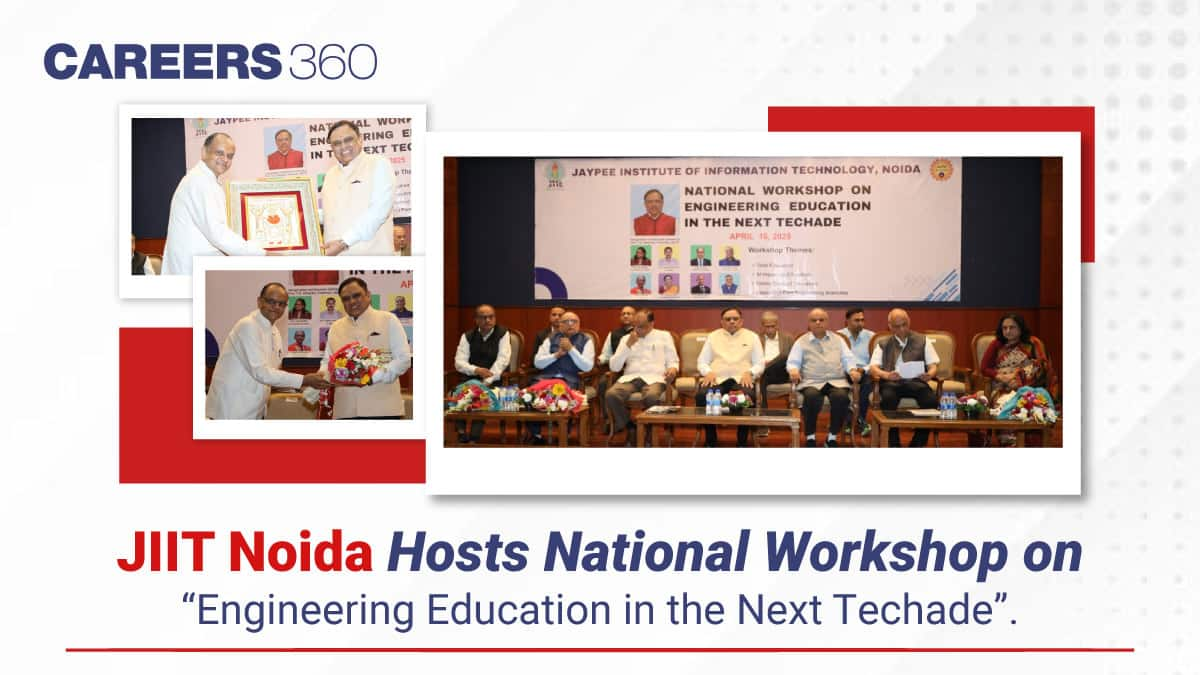Parul University B-TECH Admissions 2026
India's youngest NAAC A++ accredited University | NIRF rank band 151-200 | 2200 Recruiters | 45.98 Lakhs Highest Package
Noida, India — Jaypee Institute of Information Technology (JIIT), Noida, successfully organised a national workshop titled "Engineering Education in the Next Techade" on April 16, 2025. The event brought together distinguished leaders from India’s premier engineering institutions to share insights on the evolving landscape of engineering education in the age of digital transformation.

The chief guest for the event was Prof. T.G. Sitharam, Chairman, All India Council for Technical Education (AICTE). Shri Manoj Gaur, Chancellor of JIIT, warmly welcomed the chief guest and a distinguished lineup of speakers, including Vice Chancellors and Directors from IITs, IIITs, and leading technical universities across the country.
Held at the Jaiprakash Sabhagar, JIIT Noida, Sector 62 Campus, the workshop witnessed an enthusiastic participation of over 1,000 attendees, including academicians, researchers, and students. The event was inaugurated with a ceremonial unveiling of a statue of Goddess Saraswati, symbolising wisdom, learning, and knowledge.
Prof. T.G. Sitharam informed the participants about various AICTE initiatives that are significantly contributing to strengthening the nation's technical education sector. Shri Manoj Gaur highlighted several recent initiatives undertaken at JIIT, such as the establishment of a supercomputing Lab (Ramanujan Universe), a VLSI Lab, and a Digital Learning Centre.
He also shared the institute’s future plans, including the development of a new campus near Jewar Airport, and emphasised the pivotal role of Jaypee Universities in contributing to the creation of skilled technical manpower to support the national mission on Artificial Intelligence and Semiconductors. The workshop featured three focused technical sessions, each highlighting key themes relevant to the future of engineering education:
The first session, Impact of Artificial Intelligence on Engineering Education, included insightful talks from Prof. K.K. Pant, Director, IIT Roorkee, who discussed the Challenges and Opportunities of Artificial Intelligence in Engineering Curricular Design; Prof. Ranjan Bose, Director, IIIT Delhi, who spoke on Leveraging AI in Higher Education Institutions; and Prof. Prateek Sharma, Vice Chancellor, DTU, who explored the Role of AI in Engineering Education using various examples.
The second session, themed Total Education, featured Prof. Rajeev Ahuja, Director, IIT Ropar, who discussed the Role of Research in Future Engineering Education, and Prof. Ranjana Jha, Vice Chancellor, IGDTU, who presented on the Role of Women in Education, Enlightenment, and Empowerment.
The final session, Technology-Empowered Blended Education, included talks by Prof. G. Sundar, BITS Hyderabad, who spoke on Innovating Education for the Digital Age; Prof. Uma Kanjilal, Vice Chancellor, IGNOU, who gave a talk on The Future of Learning: Education 4.0 and Its Impact on Online Engineering; and Prof. Vignesh Muthuvijayan, IIT Madras, who addressed Interventions in Higher Education by Integrating Digital Content. The workshop provided a platform for thought-provoking discussions on aligning engineering education with emerging technologies and innovative pedagogical approaches. It concluded with a roundtable discussion involving all invited experts.
Disclaimer: This content has been published as a part of the marketing initiative between JIIT Noida and Careers360.
On Question asked by student community
Hello,
B.Tech (CS) is generally considered better than B.Sc. (CS) if you want to make a strong career in engineering or tech fields. It has a more in-depth syllabus, better job scope, and is more valued by companies.
However, if you are getting B.Sc. (CS) from JIIT Noida-62 and don’t
I cannot go in a single way but as per my sources and things I have researched. if you want to get a proper settled arbitrary way of learning JIIT Noida is the based choice but if you want a complete balance and have diverse modification of the subjects then
Hello, first off, congrats on getting into JIIT Noida-62 for B.Sc. Computer Science—that’s a solid achievement. The campus has a decent academic atmosphere, and while most people talk more about the B.Tech crowd, the B.Sc. program also gives you a good base in programming, logic, and applied computing. If you’re
KIET Ghaziabad and JIIT Noida are both good private engineering colleges. But JIIT Noida is a little better in terms of placements, especially for Computer Science and IT branches.
JIIT Noida gets more big companies like Amazon, Adobe, and other product-based companies. The average package in JIIT for CSE is
Hello Aspirant,
Any student who has taken a lower branch seat but waiting for upgradation will be allotted a seat much sooner than the student who left the lower branch seat and is only on the waiting list. The former is already in the system considered for upgradation in each
Among top 100 Universities Globally in the Times Higher Education (THE) Interdisciplinary Science Rankings 2026
Recognized as Institute of Eminence by Govt. of India | NAAC ‘A++’ Grade | Upto 75% Scholarships | Application Deadline: 15th Jan
Among top 100 Universities Globally in the Times Higher Education (THE) Interdisciplinary Science Rankings 2026
UG Admissions Open 2026 | Highest CTC 52 LPA | Average CTC 9.09 LPA | 60+ Collaborations with the world's best Universities
NAAC A+ Accredited | Among top 2% Universities Globally (QS World University Rankings 2026)
Last Date to Apply: 25th Feb | Ranked #45 Among Universities in India by NIRF | 1950+ Students Placed 91% Placement, 800+ Recruiters